
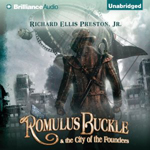 Romulus Buckle & the City of the Founders (Chronicles of the Pneumatic #1)
Romulus Buckle & the City of the Founders (Chronicles of the Pneumatic #1)
By Richard Ellis Preston; Narrated by Luke Daniels
Publisher: Brilliance Audio
Publication Date: 2 July 2013
[UNABRIDGED] – 11 hours, 38 minutes
Themes: / post-apocalypse / snow / zeppelin / steampunk / airship /
Publisher summary:
In a postapocalyptic world of endless snow, eighteen-year-old Captain Romulus Buckle and the stalwart crew of the Pneumatic Zeppelin must embark on a perilous mission to rescue their kidnapped leader, Balthazar Crankshaft, from the impenetrable City of the Founders. Steaming over a territory once known as Southern California—before it was devastated in the alien war—Buckle navigates his massive airship through skies infested with enemy war zeppelins and ravenous alien beasties in this swashbuckling and high-octane steampunk adventure. Life is desperate in the Snow World, and death is quick. Buckle and his ship’s company must brave poisoned wastelands of Noxious Mustard and do battle with forgewalkers, steampipers, and armored locomotives as they plunge from the skies into the underground prison warrens of the fortress city.Captain Romulus Buckle must lead the Pneumatic Zeppelin and its crew of ne’er-do-wells on a desperate mission where he must risk everything to save Balthazar and attempt to prevent a catastrophic war that could wipe out all that is left of civilization and the entire human race.
Romulus Buckle & the City of the Founders is a wonderful example of why books should never be judged by their covers. Because while the cover looks polished and interesting with a mysterious but kick ass hero, the story is actually pretty boring. It reminded me of the movie The Expendables. It throws in everything that typically makes an exciting steam punk adventure, but doesn’t use any of the elements to their advantages which just leaves a lot of forgettable explosions.
From the start I felt lost, like maybe I had actually started listening on the second disk because the story starts in the middle of things. Not in the middle of a fight or a heist or a battle. In the middle of the plot. Captain Buckle and crew are flying to the City of the Founders (formally Los Angeles) to break his father out of prison where he is being kept by the nefarious and secretive Founders clan. After all, why have boring Act I world establishment and character building, when you can just start at the beginning of Act II action and fill your readers in on things only as needed? As a result, I never really understood the day to day of this post-war future. In fact, the only things we are told is that civilization has devolved into family clans, all of whom specialize in a trade but none of whom really get along. At some point aliens invaded earth and mingled with humans long enough to leave half-alien children behind, but they are gone now. And humans may or may not be limited to Southern California. The elusive Founders Clan, who has been kidnapping people from other clans, seems important and everyone seems wary of them but I was never really clear on their role in society. It is defiantly not a world in which you can lose yourself.
But I can forgive mediocre world building for some great swashbuckling characters. After all, our hero is named Romulus Buckle and captains a zeppelin. But don’t have your heart set on Errol Flynn, because Buckle, like the rest of the cast are all straight from a mold. Buckle is dashing, brave and heroic because we are told he is, not because we are shown it. His half-alien stepsister is aloof because she’s an alien. There are goofy, well-meaning sidekicks, wise, old mentors, and mustache twirling villains, but none of this paper doll cast has the panache to hold my attention much less carry a story that is ninety percent action scenes. I’m not sure Preston would have bothered with the dialogue necessary to string the action together if it wasn’t the only way to publish a book. It was not until the last chapter that sets things in motion for the sequel that things became more interesting.
Overall, this is a pretty mediocre book that will a appeal more to teenage boys and diehard steam punk fans. Luke Daniels, the narrator, has a nice, manly voice that does the tone of the book justice but I found it difficult to keep track of what was happening when listening to lengthy action scenes. This is Preston’s debut novel and it feels like it, so be prepared for some clumsy storytelling.
Posted by Rose D.
 Rivers
Rivers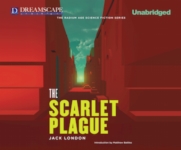
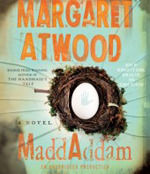 MaddAddam (MaddAddam #3)
MaddAddam (MaddAddam #3)

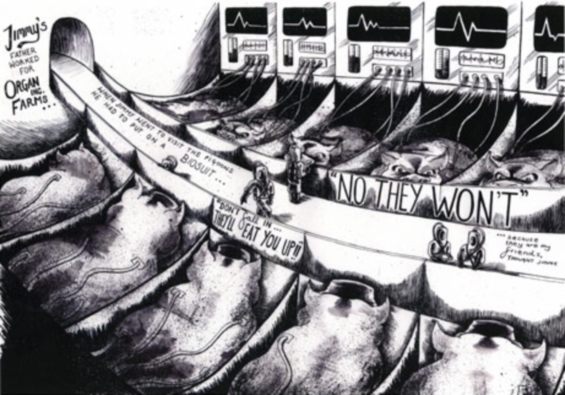
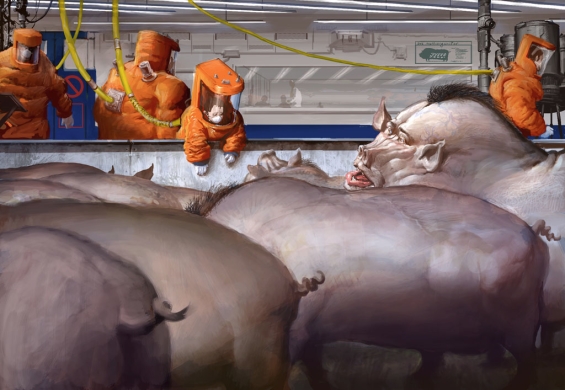
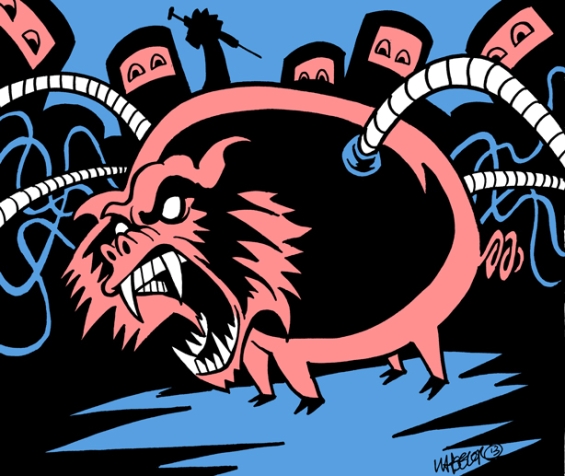
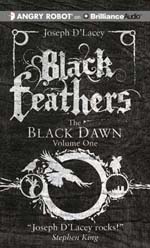 Black Feathers (The Black Dawn #1)
Black Feathers (The Black Dawn #1)